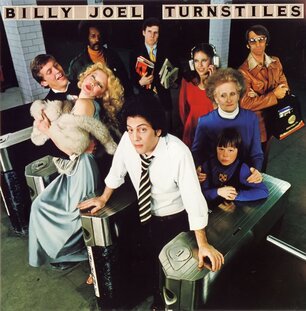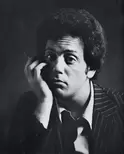|
Summer, Highland Falls
Turnstiles (1976) |
Now we are forced to recognize our inhumanity Our reason coexists with our insanity And though we choose between reality and madness It's either sadness or euphoria "Summer, Highland Falls" is perhaps Billy Joel's finest song. Although it was never released as a single, it has become one of his most beloved and admired songs. Written in 1975 and released on Turnstiles in 1976, the title refers to Highland Falls, New York, a small town in upstate New York. Billy, his wife Elizabeth, and stepson Sean, first lived in Highland Falls upon returning to New York after three years in California (the photo in the background of this page is the house that they rented). Although they only lived there for a relatively short time, Billy's return to Highland Falls, New York marked an important turning point in his life and career. Vertical Divider
|
They say that these are not the best of times But they're the only times I've ever known And I believe there is a time for meditation In cathedrals of our own Now, I have seen that sad surrender in my lover's eyes And I can only stand apart and sympathize For we are always what our situations hand us It's either sadness or euphoria So we'll argue and we'll compromise And realize that nothing's ever changed For all our mutual experience, Our separate conclusions are the same Now we are forced to recognize our inhumanity Our reason coexists with our insanity And though we choose between reality and madness It's either sadness or euphoria How thoughtlessly we dissipate our energies Perhaps we don't fulfill each other's fantasies And as we stand upon the ledges of our lives, With our respective similarities It's either sadness or euphoria |
|
The summer in Highland Falls was no doubt a time to reflect for Billy. While ostensibly about the give-and-take, yin-and-yang, of life and relationships, the song is also about the ambivalence that we all face individually and collectively as we analyze our relationships and lives, as we get older and move on, and as we "stand upon the ledges of our lives." The rolling piano arpeggios and the up-and-down bass line perfectly capture this ambivalence and contrast, the "sadness or euphoria" of life, and ultimately the resignation and realization that nothing's ever changed.
Billy has also stated that the song was about his relationship (with Elizabeth) at the time, and realizing that their relationship was not perfect but was beginning to wear. The "honeymoon" period of their relationship was over and he realized that there were issues in the relationship that were not resolved. This is one of Billy's first songs about the ambivalence he had about that relationship. In his previous albums, most of the songs about Elizabeth are unabashed love songs such as "She's Got A Way," "You're My Home," and "If I Only Had the Words." But in "Summer, Highland Falls," Billy expresses ambivalence, resignation, and a muted hope. Many other songs like this would follow. |
"I can only stand apart and sympathize"
|
The song is also about manic-depression or bipolarity. Billy introduced the song as being "for all the manic-depressives out here tonight" in his 2008 Shea Stadium concert. Billy has been known to "go to extremes" in happiness and depression, like many other gifted artists. The rise and fall, back and forth, of the bass line juxtaposed against the rolling arpeggios perfectly reinforce the lyrics and give one a sense of euphoria and sadness, simultaneously. Like many great lyrics, the song is subject to multiple, equally valid interpretations.
For a while it seemed that only hardcore Billy Joel fans even knew this song, perhaps because the title is somewhat vague. It's too bad. For all the critics who have panned Billy Joel for atypical songs such as"We Didn't Start The Fire" or "Uptown Girl," this song is a stunning and beautiful rebuttal. Over the years, as Billy re-introduced it in his live performances, it has become more appreciated and recognized. I am surprised there are so few cover versions of "Summer, Highland Falls." The folk trio Peter, Paul, and Mary did a cover version, but few else have. Tori Amos or Sara Bareilles would be appropriate singers to do a cover version.
Billy released a live version of the song on 1981's Songs In the Attic. He performed it at 1985's Farm Aid concert. He again performed it live on several occasions, including on the A&E Special, Masterclass in 2001. And he did a masterful version of it in 2008 at the National Press Club annual meeting on C-Span and again that year at Shea Stadium, as noted, which is on the CD/DVD set too. This is a song that will endure, it is timeless.
Billy released a live version of the song on 1981's Songs In the Attic. He performed it at 1985's Farm Aid concert. He again performed it live on several occasions, including on the A&E Special, Masterclass in 2001. And he did a masterful version of it in 2008 at the National Press Club annual meeting on C-Span and again that year at Shea Stadium, as noted, which is on the CD/DVD set too. This is a song that will endure, it is timeless.





